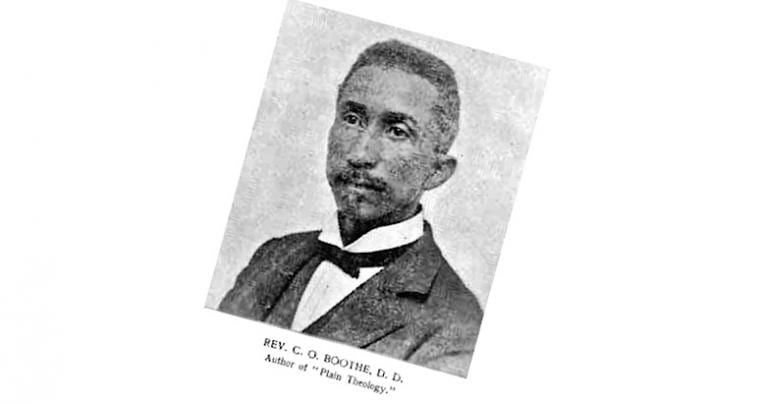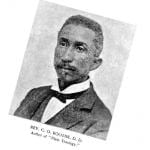 Read The Bible and slavery will die out: it is an abolitionist book. Race based slavery is impossible to a Bible reader without mental disfigurement. You cannot read the entire book and own a man. The slavers knew it and produced a Bible with all those bits removed . . . and there were many of them.
Read The Bible and slavery will die out: it is an abolitionist book. Race based slavery is impossible to a Bible reader without mental disfigurement. You cannot read the entire book and own a man. The slavers knew it and produced a Bible with all those bits removed . . . and there were many of them.
Forget the slavers misuse of Scriptures, instead we can turn to the freedman who knew the Bible was his Bible. Charles Octavius Boothe was born a slave and when free used the Bible and his God-given gifts to bring what he called “uplift” to African-Americans and great gifts to the entire church. His book Plain Theology for Plain People should be read by anyone who wishes to understand the entire story of Evangelical American Christianity. Even if not an Evangelical, all Christians should take the time to follow the ideas of a mind awake and in love with Christ.
For Boothe, the Bible was not instrumental to one good cause, but a ground for knowledge of how to live the good life. He was a man who lived fully in his time, doing good, but not a man of his time, because the Bible lifted him to a higher plane. He entered a great conversation that was, is, and will be as a result of his faithful attempt to understand the text of the books of the Bible.
Reverend Doctor Charles Octavius Boothe was a Bible man. His text is soaked in Scripture, few pages failing to cite long passages to make his argument. He believes he is interpreting what God has revealed in the written Word of God.
Boothe asserts three axioms:
- Humans are moral creatures with a conscience.
- God is Creator, so “his character is the standard of right and wrong.”
- God’s character can only be known by our limited minds if God reveals Himself.
As a result, we would expect God to reveal Himself:
“Maybe,” some one will say, “it is probable that God is hiding his character from his intelligent creatures.” It is out of place for a man who stands in full view of the light of day to say that probably the sun has not risen. But allow the statement that God probably desires to hide his will from man touching man’s moral conduct, and we shall see that we have set him against himself—God against God, the divine government against the divine government. How can he enforce his law against one to whom he has not revealed the law? I speak of intelligent beings.
Here Boothe is talking to Christians in a (mostly) Christian land. He is noting that the idea that the good God would have left us a record to reveal Himself is not surprising. We should anticipate it and when we find it, use this record to go Godward!
Why the Bible? Boothe says “the Bible contains the marks of the Divine mind.” He points to the “simplicity of its records.” The Bible writers speak what they think directly without apology, bluntly what they have seen (“not even removing seeming contradictions”). Boothe points to the fulfillment of prophecy over time. The Bible gets the course of history right over time. We would expect to see Egypt today, but not the Assyrians and so it is.
Dr. Boothe believes most of the Bible points toward Jesus:
Christ appeared in a time that was made ready for him. The dispensation of types and shadows had finished its mission. Its rites and ceremonies were ordained to excite inquiry. They had done this.
Boothe cites Josephus and Tacitus as disinterested witnesses to Jesus Christ and his impact on the world. He points to the nearly unique ability of Christianity to spread to every nation and be understood by them. Christianity could conquer even the Empire of Rome!
Boothe makes a trilemma, but a different one than is often made. He makes a cultural argument for Christianity based on the character of Christians and what Christianity has done:
Before any man can dispute the claims of Christ and Christians, he must prove that the men and women who have given the world its richest blessings are all fools, fanatics, or liars; for the world owes more to Christianity than to all other creeds, and more to Christians than to all other sects among men.
Boothe is in no need of being told Christians have also done bad things. He was capable, as a brilliant man, of looking back over history and seeing what the world would look like without Christ and Christians. He could see what the operation of the Biblical message was over time. He doubles down:
I repeat the statement that every person whose being and character are ennobled by the faith of Jesus Christ is a witness to the authenticity of the New Testament. The doctor can produce no evidences of skill, and leave no praises for his medicines so conclusive, as the health and strength of persons recovered from the power of dangerous diseases. And this wonderful operation of turning sons of sin into sons of righteousness ought to end all controversy as to whether or not Jesus is the Messiah of the Old Testament.
This is a fascinating argument that would have to be unpacked with care. Boothe’s trilemma appears easy to refute, until you consider Boothe and think more deeply!
Boothe notes that God wrote some of the law himself, inspired holy men, and finally came as the Word to inspire the written word. Why? There we learn of God much that would be unknowable without God’s revelation. We find God loves us and is good. We find the “duties and relations of life.”
Boothe was a Bible man and as a result he lived a life of thought, social action, and service to the church. If we are looking for Evangelical heroes or models for own time, perhaps we could begin with any person who is like Charles Octavius Boothe.
—————————————————————-











